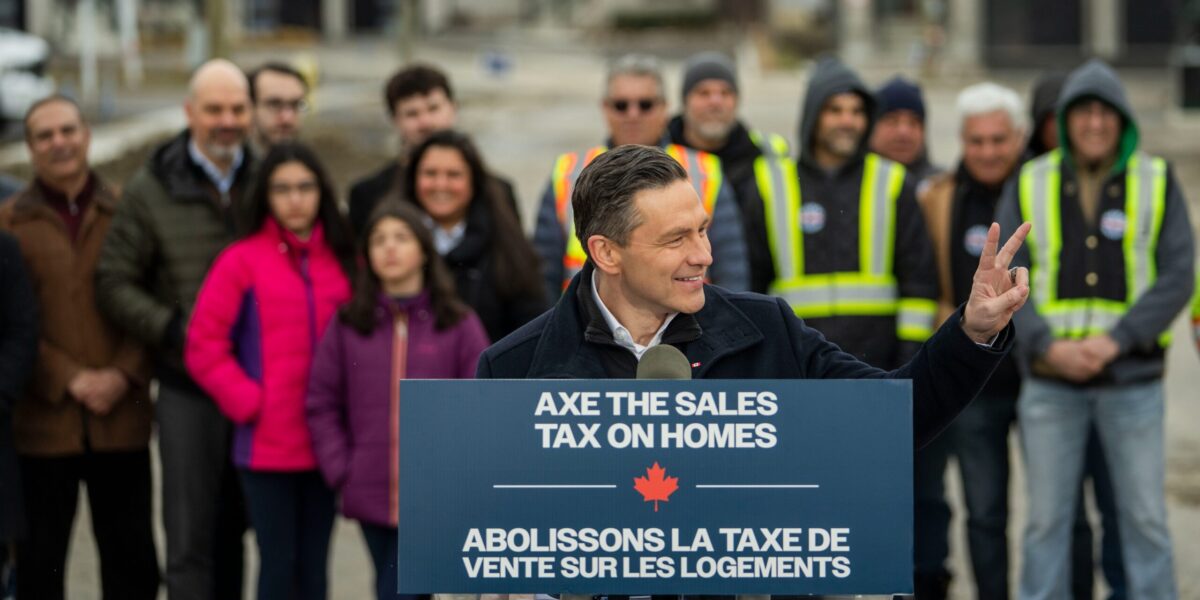The federal election has begun and voting day will be on April 28. It is the most pivotal election in more than a century, which Prime Minister Mark Carney rightly framed as a crossroads for Canada’s identity and sovereignty, given Donald Trump’s trade war against Canada, and his repeated threats to annex this country as the 51st state.
Against this backdrop is his opponent, Conservative Party leader Pierre Poilievre, a troubling and flawed figure — a career politician with two decades in Ottawa’s bubble, untested by the real world, now vying to lead a G7 nation facing an existential threat from the US. As recently as three months ago it looked like he was on the road to an overwhelming victory, with a lead of 18 points or more in the polls. But that is no longer the case as recent polls show a horse race between the Liberals and the Conservatives, with some polls showing the Liberals in the lead.
Poilievre’s campaign kicked off with a nod to Trump’s threat, but he quickly reverted to his oft repeated slogan of “Canada is broken,” a phrase reminiscent of Trump’s own rhetoric during his presidential campaign. He pins every national woe on a decade of Liberal rule under Justin Trudeau, ignoring broader global factors that created those problems. Compared to Carney, a seasoned veteran of international finance and banking, and a former governor of the Bank of Canada and Bank of England, Poilievre’s resume is paper thin.
For his entire adult life – more than 20 years – Poilievre has lived in the insulated world of partisan politics, placing him among the nation’s elites. He has never ventured into the private sector or grappled with the real-world complexities that impact ordinary Canadians’ lives. This lack of depth is more than a career quirk — it is a major leadership liability that should not be ignored by Canadian voters. His career in partisan politics, devoid of real world experience, leaves him ill-prepared for the geopolitical and economic storms ahead. At this moment in history Canada needs a leader with major-league gravitas, something which Poilievre lacks in spades. And against an adversary like Trump, Poilievre’s lack of experience outside of politics could be a weakness that would undermine Canadian independence.
His Trump-like persona compounds the problem. With bombastic rhetoric, simplistic slogans, insults targeting opponents, and a knack for sowing divisiveness, Poilievre mirrors the US president’s style and substance. His disdain for environmental rules, antipathy towards mainstream media, and coziness with corporate interests, echoes Trump’s playbook, appealing to the approximately 20 per cent of Tory supporters who admire the man. This raises a troubling question. As prime minister, would Poilievre resist Trump’s aggression or cave to his demands and reduce Canada to a vassal state? His untested mettle and apparent fondness for the Trumpian style of politics suggest the latter, which risks Canada’s sovereignty.
Economically, Poilievre has consistently oversimplified the issues Canadians face. As people across the country grapple with a housing and a cost-of-living crises, rooted in a post-pandemic global upheaval — challenges no leader could have effectively managed — he blames the Liberals entirely for the problems Canadians face, sidestepping Canada’s strong economic performance relative to peer nations, especially the US. His fixes — ditching environmental and climate change policies, cutting corporate taxes, cracking down on crime — lack originality, are no different from Trump’s platform, and are recycled Tory promises from previous unsuccessful election campaigns.
National security offers another red flag. Since taking the Conservative Party’s helm, Poilievre has refused security clearance for intelligence briefings — a reckless choice in an age of foreign interference and rising global tensions. Carney, by contrast, sought clearance immediately upon becoming Liberal leader. Poilievre’s dismissal of this duty betrays public trust, prioritizing his political agenda over the nation’s safety. His refusal to obtain his clearance also fuels doubts about his leadership and his party’s integrity, as Canadians can’t be sure that his team is untainted by external influence.
The difference between Canadian and American values further highlight the stakes. Canadians value fairness, diversity, inclusivity, and environmental care — principles that Trump threatens, as does Poilievre’s political agenda. He has openly said he would use the Constitution’s notwithstanding clause to override rights, a move straight from Trump’s authoritarian script. This isn’t abstract, it is a real risk to the Charter of Rights and the rule of law, favoring personal political gain over the public good. Poilievre’s willingness to bend Constitutional norms signals a dangerous disregard for some of the values Canadians cherish, which would be at risk were he to win the election.
This election transcends picking a prime minister. It’s about protecting Canada’s sovereignty and soul. Poilievre’s insulated political career and Trumpian leanings, is a gamble too costly to take. His leadership could falter at a time when toughness in dealing with the US is non-negotiable, potentially ceding sovereignty to Trump. Canadians need a leader rooted in reality, not one who fuels division and undermines the institutions that define our pluralistic society. Poilievre isn’t just a risk, he is someone with the wrong stuff for the job.



